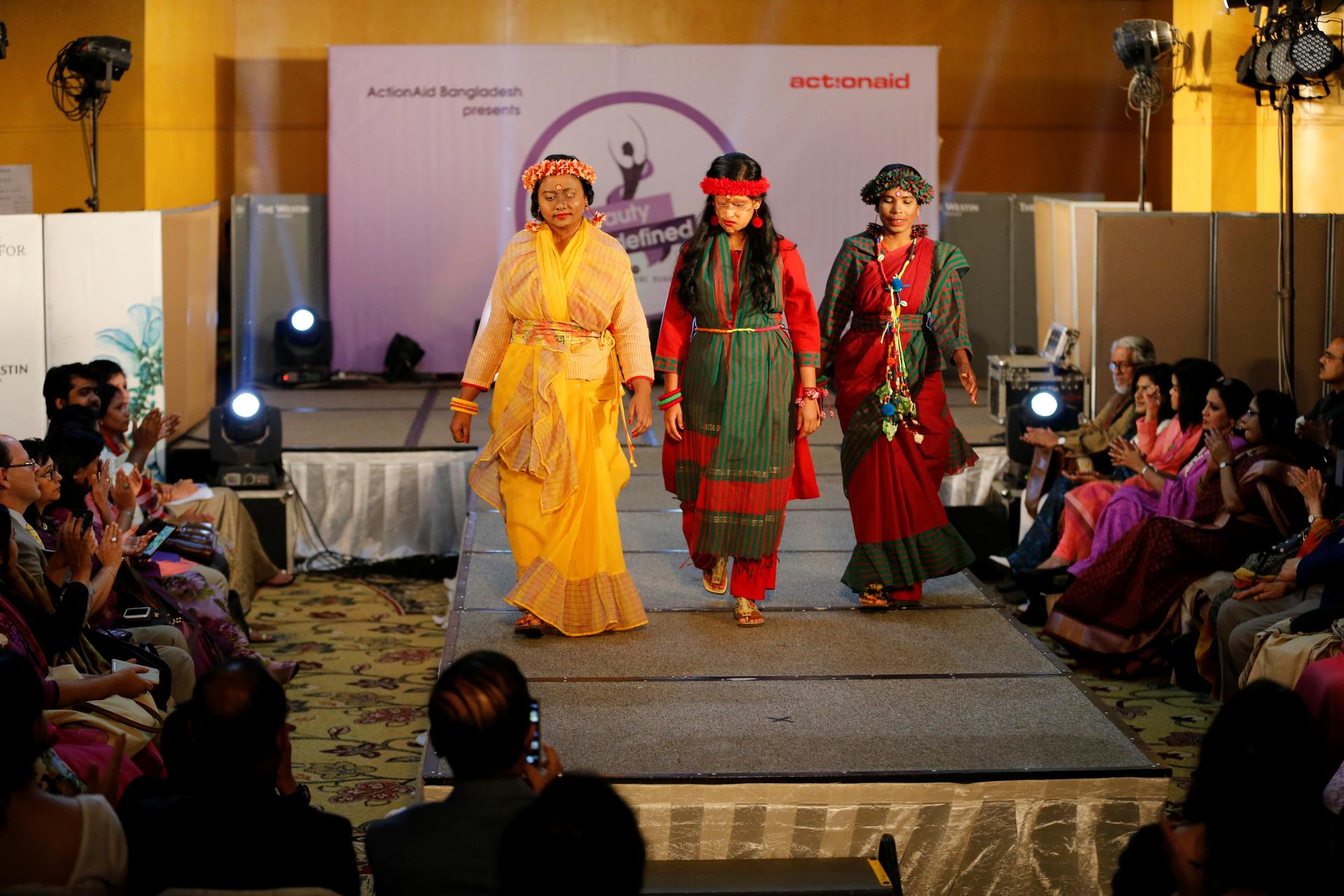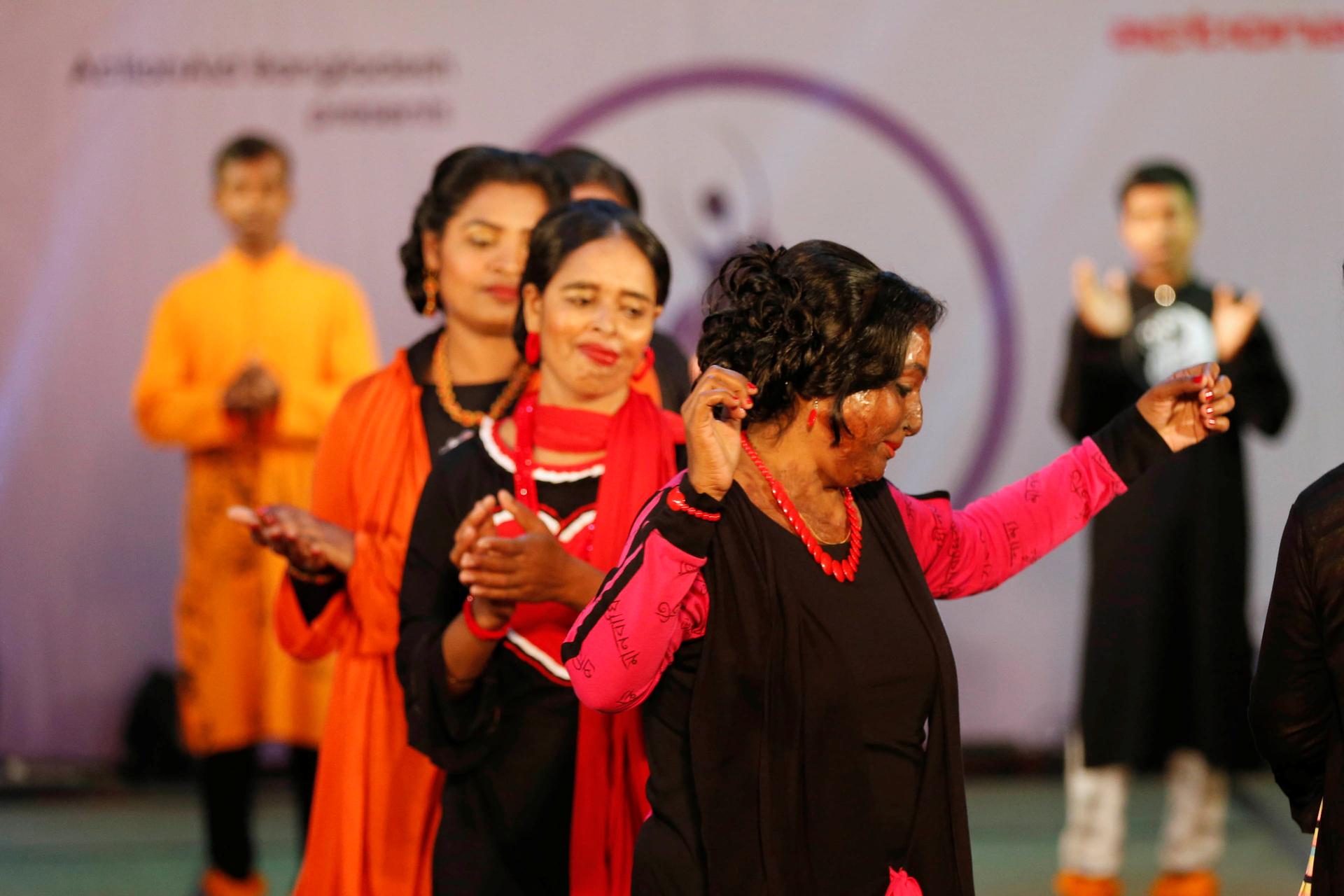Acid attack survivors walk on the ramp as they participate in a fashion show titled, “Beauty Redefined,” organized by ActionAid in Bangladesh earlier this year.
It's a fashion show to make a difference.
The charity, ActionAid, organizes events to spread awareness about the hundreds of acid attacks that happen around the world each year.
Each of the 15 models from Bangladesh had been attacked by men as a form of revenge, so they'd be humiliated, silenced and forced to hide from the world.
As they walked the runway in London this week, they did just the opposite.
The World spoke to BBC reporter Tulip Mazumdar, who was there.
Marco Werman: What was it like at the foot of the catwalk?
Tulip Mazumdar: It was unexpectedly really emotional. Actually, I'd spent the day with some of these women and girls, and I'd heard their stories and what they'd been through, really understanding what it took for them to get on that stage. It started off a little bit morose — I think they were all quite nervous. They walked to the front; they sort of stared defiantly into the crowd. But then as the fashion show went on, some of them started dancing; they were smiling, and it showed that these women are not just victims, that they are survivors.
MW: You spoke with one survivor of an attack — a woman named Nahar. Tell us about her.
TM: She is a young woman, she's in her late 30s now, but she was 15 years old when she was attacked.
"The boy proposed me for love. I reject him, and he was angry. And one night he came to my house and threw acid. It was very painful. I felt burning in my face, in my hand. I was screaming."
"What did you think would happen to you, to your life, at that point?"
"I thought it is finished. No chance to go back, study, or job, or do something. I always tried to hide myself; I wear cover on my face."
And what she went on to say later in our chat is, "I can't change my face, but I can change my life and that's what I'm doing." She's gone on; she's in the middle of doing a master's. She is actually the one that has created this survivors group where she is in touch with around 200 other acid attack survivors.
Clearly, you know this isn't a type of attack that you can play down in any way. These are horrific injuries. It has a lasting physical effect obviously, but also a psychological effect. Many of these women are blamed for these attacks; they're ostracized from their communities because in many of these communities a woman's worth is seen in her beauty and her capacity to marry. Once that is taken away by these men — certainly that's what they try to do — [the women] are seen as a waste. And there are many more [acid attack victims] like them that are sitting at home, that are hiding and aren't getting the help they need. That is who they are trying to reach out to.
MW: Acid attack crime has also been growing in Britain, hasn't it?
TM: Unlike what we see internationally, these are believed to be criminal gangs who are using acid against men. In South Asia or in other areas, these are attacks against women, to try and ruin their lives, ruin their beauty, ruin their chances of marriage — given that marriage is seen as such an important part of a woman's life. But here in the UK, it’s about criminal gangs attacking each other. There are estimates that there have been more than 400 cases in six months alone, between the end of 2016 and the beginning of 2017.
There has been legislation that's been proposed by the government here to deal with this, making it more difficult for people to buy acid, particularly teens. And there has been similar legislation, by the way, in Bangladesh for more than a decade, and they have actually seen acid attacks come down from something like 400 every year to fewer than 100. So, in a way, the UK is behind countries like Bangladesh, and they are kind of catching up.
MW: When we cover suicide in the media, we're careful to avoid the risk of inspiring copycat events; we avoid giving explicit details of the method used. Should we follow a similar caution when we cover acid attacks?
TM: Internationally, this is violence against women. This is keeping women down, this is showing control, patriarchy. And actually, the way you stop these sorts of attacks, many of the charities who work with these women say, is that you deal with the innate, extreme sexism that exists in some of these communities. You teach and encourage communities to see women as equals, as people in their own right, and not as something that can be disrespected and injured in this way.
You can listen to The World's full interview with Tulip Mazumdar above.
.jpg&w=1920&q=75)

Our coverage reaches millions each week, but only a small fraction of listeners contribute to sustain our program. We still need 224 more people to donate $100 or $10/monthly to unlock our $67,000 match. Will you help us get there today?
